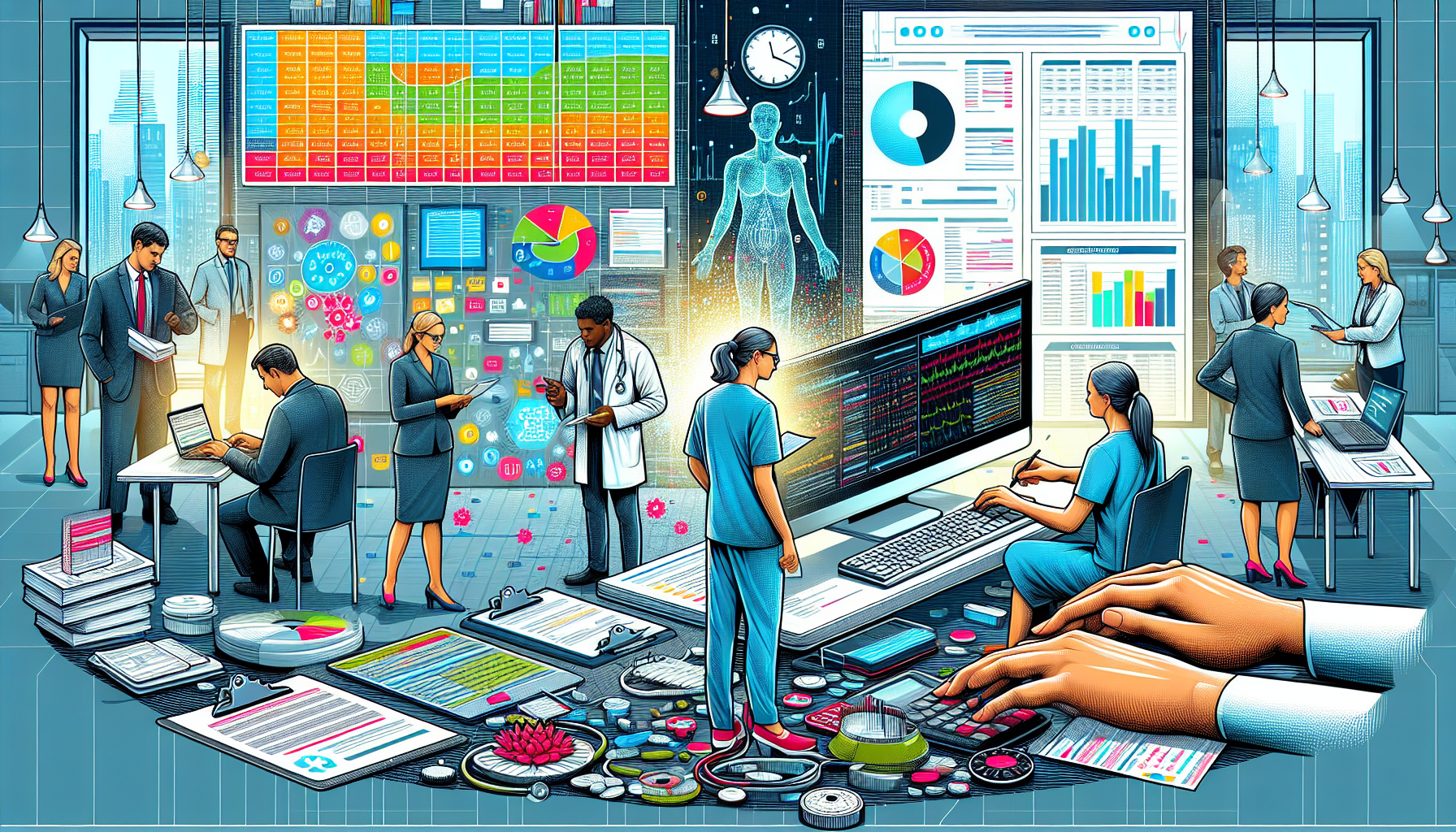Top Online Training for Medical Billing and Coding: What You Need to Know
Want to start a career in medical billing and coding? Online training for medical billing and coding can get you there with flexibility and depth. Learn about the top programs, their benefits, and how to choose the right one for you, plus tips for certification exams.
Key Takeaways
- Online medical billing and coding programs offer flexible course formats, preparing students for certification and careers in a relatively short timeframe (6 months to 1 year).
- Accreditation, cost, and curriculum quality are essential factors to consider when selecting a suitable online program for medical billing and coding training.
- The healthcare industry is expanding, providing numerous job opportunities for medical billing and coding professionals, with salaries ranging from $40,000 to $75,000 annually.
Understanding Online Medical Billing and Coding Programs

Online medical billing and coding programs are designed to equip students with the knowledge and skills needed to perform medical billing and coding tasks efficiently. These programs typically offer two course formats: synchronous and asynchronous learning. Synchronous courses require students to attend live online classes at specific times, fostering real-time interaction with instructors and peers. On the other hand, asynchronous courses offer greater flexibility, allowing students to access course materials and complete assignments at their own pace.
The duration of these taught medical assistant programs usually ranges from 6 months to 1 year, making them a relatively quick pathway to entering the workforce. Comprehensive programs cover essential topics such as medical terminology introduction, coding procedures, and health insurance processes. Students engage with various learning materials, including video lectures and online training modules, to reinforce their understanding of these subjects.
Graduates of these programs are prepared for certification exams and equipped to start their careers in medical billing and coding. Their training enables them to efficiently process patient data, manage medical records, and ensure accurate billing and coding in healthcare settings.
What is Medical Billing and Coding?
Medical billing and coding is a crucial process in the healthcare industry that involves assigning standardized codes to diagnoses and procedures for insurance reimbursement purposes. Medical coders, also known as certified professional coders (CPCs), use medical terminology and coding systems such as ICD-10 and CPT to translate patient data into codes that can be used for billing and insurance claims. Medical billers, on the other hand, use these codes to create claims and submit them to insurance companies for reimbursement. The goal of medical billing and coding is to ensure that healthcare providers receive accurate and timely payment for their services.
Benefits of Online Training for Medical Billing and Coding

One of the major advantages of online training is its flexibility. Students can study from anywhere, which helps balance personal and work commitments. This is especially helpful for those without access to local training institutions or who have demanding schedules. Online courses allow students to learn at their own pace and revisit materials as needed, fostering a thorough understanding of complex topics like medical coding and billing.
Online training accommodates different learning preferences by incorporating diverse materials such as audio lectures and critical-thinking exercises. This variety keeps students engaged and enhances their retention of information. Additionally, expert coaches are available to provide support and answer questions throughout the coding training process, which can be invaluable for grasping challenging concepts and staying motivated.
Performing medical billing and coding tasks remotely is another significant benefit, opening up numerous job opportunities. Whether aiming to work for a healthcare facility, an insurance company, or start your own medical billing business, the skills gained through online training are indispensable.
Choosing the Right Online Program
Choosing the appropriate online medical billing and coding program is essential for success in the field. Beginners should consider factors like budget, learning style, schedule, and quality of instruction. Thorough research helps avoid disreputable companies and ensures a legitimate education.
Key considerations include accreditation, cost, financial aid options, and curriculum alignment with certification requirements.
Accreditation and Reputation
Accreditation and reputation are critical when selecting an online medical billing and coding program. Accredited programs, often available through community colleges, offer comprehensive training and specific knowledge needed to become a medical billing and coding specialist. Checking instructor credentials, reviewing student feedback, and ensuring the curriculum aligns with certification goals is vital. Essential courses should include medical terminology and diagnostic coding.
Free online courses might seem appealing, but they often lack the depth of education needed to secure a job in this field. Formal training from accredited institutions is recommended to ensure you are well-prepared for the job market’s demands.
Programs at non-profit institutions often undergo more oversight, ensuring better educational quality and enhancing job prospects.
Cost and Financial Aid Options
Online medical coding courses are generally more affordable than traditional college programs, making them cost-effective for many students. Tuition rates vary, with public two-year colleges averaging around $3,598. For instance, Sinclair Community College offers a technical certificate in medical coding with costs between $141 to $344 per credit, depending on residency. Southcentral Kentucky Community and Technical College requires 22 credits to graduate, costing $186 per credit for in-state students.
Financial aid, including need-based and merit-based options, is available for those who qualify. Students usually need to complete the FAFSA (Free Application for Federal Student Aid) to determine eligibility for financial assistance. Exploring these options can make online medical billing and coding education more accessible and affordable.
Curriculum and Certification Preparation
A comprehensive curriculum is vital for students pursuing a career in medical billing and coding. Programs like Lake Land College emphasize diagnostic and procedural coding and offer internships in medical facilities. Paris Junior College prepares students for certification exams while covering critical subjects like integrated software applications. Barton County Community College’s curriculum includes business English and medical administration skills, culminating in a coding certificate.
Certification preparation is a key component of these programs, with high pass rates enhancing students’ return on investment. A thorough understanding of healthcare documentation and coding certification and numeric coding, as provided by programs like Southwest Wisconsin Technical College, is crucial for success in certification exams and career opportunities.
Types of Online Medical Billing and Coding Courses
There are a variety of online medical billing and coding courses available, each tailored to different learning preferences and career objectives. Some common types of courses include:
- Certificate Programs: These programs provide specialized training in medical billing and coding and are usually designed for individuals who already have a background in healthcare.
- Diploma Programs: Offering a more comprehensive education, these programs are often designed for individuals new to the field, covering essential topics like medical terminology and coding procedures.
- Associate’s Degree Programs: These two-year programs provide an in-depth education in medical billing and coding, often including courses in healthcare management, making them ideal for those looking to advance in the healthcare industry.
- Online Certification Prep Courses: Specifically designed to prepare individuals for certification exams such as the CPC, CCA, or CBCS, these courses focus on the skills and knowledge needed to pass these exams successfully.
Free and Low-Cost Options
While free online medical billing and coding courses are limited, there are some low-cost options available:
- Community Colleges: Many community colleges offer low-cost medical billing and coding programs accredited by recognized academic accreditors, providing a solid foundation for a career in this field.
- Online Certification Prep Courses: Organizations such as AAPC and AHIMA offer affordable certification prep courses that can help individuals prepare for certification exams.
- Free Online Resources: Numerous free online resources, such as video tutorials, webinars, and blogs, provide an introduction to medical billing and coding, helping learners grasp basic concepts and stay updated on industry trends.
Top Online Medical Billing and Coding Programs

Several top-tier online medical billing and coding programs stand out for their quality and accessibility. GateWay Community College offers a certificate program that can be completed in about 11 months at a cost of around $4,180. Fox Valley Technical College provides a medical coding specialist diploma, costing about $4,962 and offering both full-time and part-time online options.
Waubonsee Community College offers a comprehensive medical billing and coding certificate program, costing about $4,958. These programs accommodate various schedules and commitments, making them accessible to a wide range of students. Choosing one of these reputable programs ensures a solid foundation for your career in medical billing and coding.
Supplemental Resources for Learning
Supplemental resources can greatly enhance your learning experience in medical billing and coding. YouTube channels run by industry professionals provide valuable insights and basic concepts. Blogs and podcasts offer deeper understanding and keep you updated on industry trends.
Participating in online communities allows for peer discussions and support, enriching the learning process. However, it is crucial to verify the credibility of these free resources, as not all are reliable or comprehensive. These materials can complement your formal education and provide a well-rounded understanding of medical billing and coding.
Software and Tools for Medical Coders
Medical coders use a variety of software and tools to perform their job duties efficiently. Some common software and tools include:
- Electronic Health Records (EHRs): EHRs are digital versions of patient medical records that contain demographic information, medical history, and treatment plans, streamlining the coding process.
- Coding Software: Tools like EncoderPro and CodePro assist medical coders in assigning accurate codes to diagnoses and procedures, ensuring compliance with coding standards.
- Billing Software: Programs such as Meditech and Epic help medical billers create and submit claims to insurance companies, facilitating timely and accurate reimbursement for healthcare services.
Career Opportunities in Medical Billing and Coding

The healthcare industry offers numerous career opportunities for those skilled in medical billing and coding. Common job titles include medical coder, billing specialist, coding specialist medical billing, medical billers, and health information technician. Obtaining a certified professional coder (CPC) designation is crucial for career advancement, as it demonstrates an individual’s competencies and enhances career prospects. Salaries in this field range from $40,000 to $75,000 annually, depending on experience and location, making it a lucrative career choice.
The job market for medical coders is expanding, with projected employment growth of 8% by 2032. This growth is driven by the increasing complexity of healthcare regulations, which necessitate skilled professionals to manage medical records and insurance claims accurately.
Individuals like Steven Anderson and Pam McLaughlin have successfully transitioned into this field, finding new career paths and job satisfaction.
Specializations in Medical Billing and Coding
There are several specializations in medical billing and coding, each with its unique focus and responsibilities:
- Inpatient Coding: Inpatient coders work in hospitals, assigning codes to diagnoses and procedures for patients admitted to the hospital, ensuring accurate billing for extended care.
- Outpatient Coding: Outpatient coders work in clinics, coding diagnoses and procedures for patients who are not admitted, focusing on short-term treatments and consultations.
- Risk Adjustment Coding: These coders work with insurance companies, assigning codes to diagnoses and procedures to determine the risk level of patients, impacting insurance premiums and coverage.
- Compliance Coding: Compliance coders ensure that healthcare providers adhere to regulatory requirements by accurately coding diagnoses and procedures, minimizing the risk of audits and penalties.
Industry Trends and Outlook
The medical billing and coding industry is constantly evolving, with new technologies and regulations emerging all the time. Some current trends and outlooks include:
- Increased Use of Artificial Intelligence (AI) and Machine Learning (ML): AI and ML are being integrated into medical billing and coding processes to enhance accuracy and efficiency, reducing the likelihood of errors.
- Growing Demand for Certified Medical Coders and Billers: As the healthcare industry expands, the need for skilled professionals in medical billing and coding continues to rise, offering numerous job opportunities.
- Increased Focus on Compliance and Regulatory Requirements: With ever-changing healthcare regulations, there is a heightened emphasis on compliance, necessitating thorough and accurate coding practices.
- Growing Use of Telehealth and Remote Patient Monitoring: The rise of telehealth and remote patient monitoring has created new coding challenges and opportunities, requiring coders to stay updated on the latest coding guidelines and technologies.
By understanding these trends and preparing for the future, aspiring medical coders and billers can position themselves for success in this dynamic and rewarding field.
Preparing for Certification Exams

A well-structured study plan is essential for preparing for certification exams. Regular study sessions and a tailored strategy can enhance retention and understanding of the material. Familiarizing yourself with code books is crucial, as it helps you quickly locate necessary information during the exam.
Practice exams are invaluable for developing test-taking skills, time management, and accuracy. Reviewing guidelines and common coding conventions is crucial for successful code selection on the exam.
Following these preparation tips can increase your chances of passing certification exams and advancing your career in medical billing and coding.
Common Challenges and How to Overcome Them
Online learning can present challenges, such as a sense of isolation. Engaging with peers and instructors through discussions and collaborative projects can alleviate this feeling. Maintaining motivation can be enhanced by setting achievable goals and creating a structured study schedule.
Reducing distractions involves establishing a dedicated study area, minimizing social media use, and communicating your schedule to family and friends. Effective time management, including task prioritization and creating to-do lists, can help balance coursework with personal commitments.
Implementing these strategies can help overcome common challenges and ensure success in your online medical billing and coding program.
Success Stories and Testimonials
Inspiring success stories highlight the rewarding opportunities in the medical billing and coding profession. Binta Patel transitioned from a corporate career to owning a medical billing business, quickly gaining 13 clients. Tanya Uzan leveraged her background in sales and marketing to establish her own company, signing her first client shortly after completing her course.
Individuals like Lisa Johnson and Nancy Browner have found similar success, transitioning from different industries and quickly establishing multiple client relationships. These stories illustrate the remarkable potential and diverse paths available in the medical billing and coding field.
Summary
Medical billing and coding offer a promising career path with numerous opportunities for those willing to invest in quality training. Online programs provide the flexibility and comprehensive education needed to succeed in this field. By choosing the right program, utilizing supplemental resources, and preparing effectively for certification exams, you can embark on a rewarding career in medical billing and coding.
Frequently Asked Questions
What is the typical duration of an online medical billing and coding program?
The typical duration of an online medical billing and coding program is between 6 months to 1 year. This timeframe allows students to gain the necessary skills for the field effectively.
What are the benefits of online medical billing and coding training?
Online medical billing and coding training offers flexibility and allows you to learn at your own pace, making it easier to balance studies with other commitments. Additionally, you’ll have access to a variety of resources and expert guidance.
How can I choose the right online program?
To choose the right online program, prioritize accreditation, cost, curriculum quality, and instructor credentials. Evaluating these factors will ensure you make an informed decision that aligns with your educational goals.
What career opportunities are available in medical billing and coding?
Pursuing a career in medical billing and coding opens up opportunities as a medical coder, billing specialist, or health information technician, with salaries typically between $40,000 and $75,000 annually. These roles are essential in managing healthcare finances and ensuring accurate patient records.
How can I prepare for certification exams?
To effectively prepare for certification exams, create a structured study plan and utilize practice exams to gauge your understanding. Additionally, familiarize yourself with relevant code books and review coding guidelines and conventions to enhance your knowledge.

